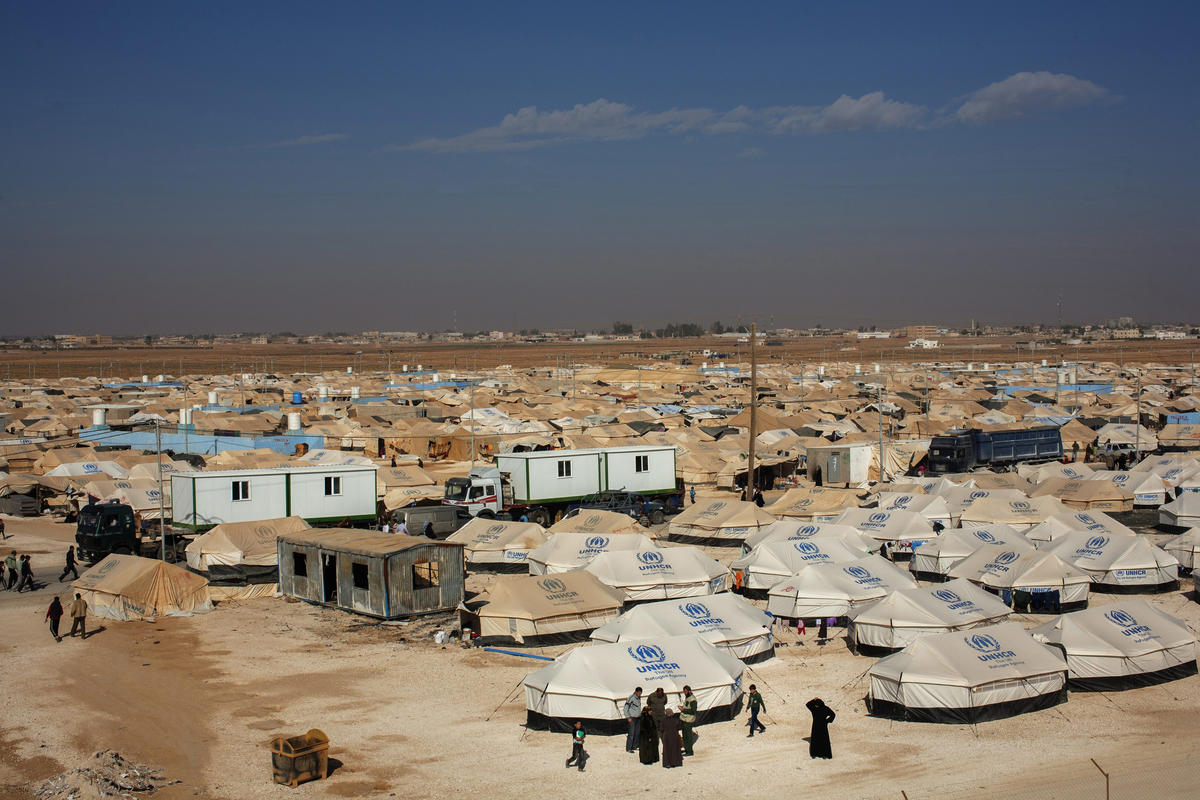Kobani refugees encouraged to move into Turkey's newest and largest camp
Kobani refugees encouraged to move into Turkey's newest and largest camp

SURUC, Turkey, February 16 (UNHCR) - Aysha, her husband Wazam and their six children, are among the first residents of Turkey's newest and largest refugee camp, which opened in late January to accommodate tens of thousands of Syrian refugees from the town of Kobani, just across the nearby border.
To date just 5,000 people have moved to the camp, which has a capacity to provide shelter to 35,000 of the estimated 192,000 people who fled to Turkey from Kobani during fighting from last September to January between militants and Syrian Kurdish forces. Although most of the 1.5 million Syrian refugees in Turkey live in urban areas, many struggle to survive without help and so the authorities here are working hard to encourage more people to move to Suruc camp from surrounding areas.
Aysha, husband Wazam, aged 51 years, and their children - a teenage girl and five boys ranging in age from 18 months to 13 years - made their way to the camp not long after it opened on January 25. They had struggled to survive in eastern Syria and then Turkey after fleeing their native Raqqa province last year and moved to Suruc out of desperation.
"Where were we supposed to go? We forced ourselves to come here," said 38-year-old Aysha, holding her restless, youngest son. They heard about the camp from friends and neighbours, who said the facilities were good and there was plenty of room. Crucially, people told them, it was free to stay there. "We have no money for the rent. We have no house. We don't even have money to buy sugar," Aysha explained.
UNHCR caught up with the family members when they were waiting in a large tent to be registered by camp officials. Their personal details were entered into a computer database and they were photographed and fingerprinted before being allocated a family tent and aid items such as a cooker, mattresses, blankets and more.
The tented camp, one of 24 built by the government for refugees (currently 230,000) across Turkey, is essentially a well-run and safe small town with shops, restaurants, a school under construction, water distribution network, electricity, fire station and more. But despite the attractions, the number of people moving to Suruc was not as high as expected.
Mehmethay Ozdemir, the camp director, said this was because the word about Suruc and its facilities and relatively high living conditions had not spread among refugees. "The problem is refugees are not well aware of the existence of this camp," he explained, before producing one of the glossy brochures being handed out in nearby towns to encourage Syrians to move to the camp.
The government's Disaster and Emergency Management Presidency, which operates the camp is also performing community outreach in the town of Suruc and in the nearby city of Urfa, encouraging local leaders to promote the camp in towns and villages. Ozdemir expects these efforts will pay off and the camp's 7,000 tents will fill up by March. "We are taking our job very seriously," he stressed.
Some of those targeted by the government campaign include refugees living in the village of Saygin, which lies 14 kms from the camp they are being encouraged to move to. But, so far, most have refused.
"I know the camp is better, but I prefer to stay here," said Layla, a 22-year-old refugee from Kobani. Standing outside her makeshift tent on the edge of a field, Layla admitted to tough living conditions, especially when it rains and the earth floor becomes muddy. But Layka insisted that it was "generally comfortable," and more like home. "It's less crowded" than a camp, she added.
Back at Suruc, where the tents are set out in compact rows and the gravel roads run at right angles to each other, Aysha and her family collected their ID cards and were shown to their tent within hours of their arrival.
Half a dozen camp employees quickly unloaded supplies from a truck to distribute them to the recent arrivals. Shortly after Aysha reached her tent, shrink-wrapped pillows, mattresses, a kitchen cabinet, pots and pans were piled up in the entrance.
Smoking a cigarette and soothing one of her cranky sons, Aysha signed off on another set of paperwork as her daughter stacked a new set of dishes on a shelf. Later, in the evening, a minibus distributing hot meals pulled into the street near Aysha's new home.
Despite the warm welcome, the camp cannot replace Aysha's home in Raqqa.
"If they give me kilos of gold, I still wouldn't feel at home," she said, standing amid piles of aid. "They gave me all these things, but I can't even feel happy about it."
By Susannah George in Suruc, Turkey










